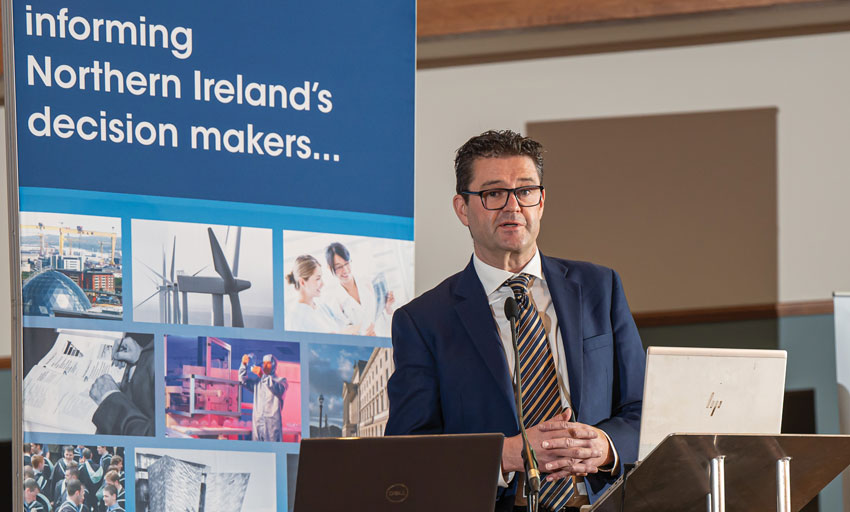
Kevin O’Sullivan: Supergrid super solution
9th October 2023
Switch to Calor for a reliable energy source for modern living
9th October 2023A route to market

Following the publication of the Energy Action Plan 2023, Head of Energy for the Department for the Economy in Northern Ireland, Deputy Secretary, Richard Rodgers, discusses the need for acceleration towards a totally decarbonised energy system.
In 2016, the closure of the Northern Ireland Renewables Obligation (NIRO), a support scheme designed to boost the generation of renewable energy, coincided with the region’s soaring reputation for renewable generation across the globe.
Far from coincidental, the scheme had served its purpose in incentivising investment in, for the most part, onshore wind turbines. Onshore wind aided Northern Ireland to far exceed targets set for renewable electricity generation in 2020 and is largely responsible for renewable electricity levels reaching over and above 50 per cent by the end of 2022.
However, since 2016, Northern Ireland has shifted from leading to lagging in renewable generation, a fact articulated by the Department for the Economy’s Head of Energy Richard Rodgers.
On why the shift has been so dramatic, Rodgers contends that Northern Ireland, as a region, failed to grasp the economic opportunity that presented itself in the form of renewable incentivisation. However, the Deputy Secretary is adamant that the opportunity still exists, so long as the region moves at speed.
In the wake of the NIRO scheme, as Great Britain and the Republic of Ireland delivered fresh supports, work on revised renewable supports for Northern Ireland were put into stasis as a public inquiry dealt with the fallout out of the failed Renewable Heat Incentive (RHI) scheme.
“RHI stopped a lot of things in their tracks, which is much of the reason as to why we have gone from being a leader in this area to being behind all of our neighbours. Looking forward though, the drive to a totally decarbonised energy system for this region is now much more focused.”
“We must move fast because we want to be part of enabling supply chains, not waiting at the back of the queue. That is why our action plans are so important, they are setting out what we are aiming to deliver now.”
In March 2023, the Department for the Economy published its second iteration of the annual energy action plans, necessitated by the overarching Path to Net Zero strategy published in December 2021. Included in the 2023 action plan is a pledge to publish the final design of renewable electricity support, along with a pathway and timeline for the support being in place, within the year.
Describing the support scheme as “critical” to putting energy policy to effective use, creating the conditions for investment, and delivering consumer protections, which are lacking today, Rodgers says: “This is so important because everyone can see that the current market is delivering high energy prices, that we, as consumers, are forced to pay.”
The final design of the support scheme, along with a timeline for the support being in place, is expected by the end of 2023. It is understood the support will target offshore wind generation, but Rodgers explains that the Department’s vision is for all future renewable generation technologies to potentially fall under the scheme’s remit.
“The launch of the design is going to be a critical path to getting offshore wind by 2030, but it has implications for all other energy, such as geothermal and biomethane. It is a design for electricity, but essentially the same principles apply to all the energy we produce.”
Asked about the potential shape of the scheme, Rodgers says that the principles are similar to that of the Contracts for Difference (CfD) scheme used in the UK, or the RESS scheme in the Republic of Ireland, whereby the aim is to competitively establish a strike price that will be payable over the lifetime of the asset.
Although it was originally touted that Northern Ireland may be part of the UK’s CfD scheme for offshore, the unique circumstances of the region meant that the decision was not taken forward. Use of CfDs has been trending across Europe because of recognition that they prove cost-effective for consumers, while offering long-term price stability that investors require to cover upfront costs.
Rodgers believes that learnings from both the UK’s and the Republic of Ireland’s schemes mean that Northern Ireland has the opportunity to do better for consumers and investors, in the scheme’s design. For example, the absence of indexation in the Republic of Ireland’s RESS has pushed prices up. Similarly, shorter contract lengths in other countries have been recognised as an obstacle, while auction frequency and eligibility criteria are also critical.
Action Plan 2023
The action plan sets out progress made by its predecessor, the 2022 action plan, but also flags a number of 2022 actions which were not achieved, and so have been rolled over.
While many may point to the absence of a functioning government in Northern Ireland, as well as the recently published ‘restrictive’ budget for public services, as cause for delay, Rodgers is quick to point out that the Department’s work is progressing on a solid foundation.
“A huge positive is that the Executive approved the overarching energy strategy, which means we have an agreed and accepted vision for where we want to get to: self-sufficiency in affordable and renewable energy. The prize, which is crucially important in today’s global energy market, is that we can become our own price maker, and not a price taker.
“That vision, which underpins the economic opportunity in self-sufficiency, provides us with the opportunity to tackle fuel poverty and boost economic growth. It is a very exciting prospect.”
Importantly, underpinning the Department and wider Government’s vision is legislation in the form of the Climate Change Act (Northern Ireland) 2022 and the draft Northern Ireland carbon budgets and recommended annual emissions for each sector, produced by the Climate Change Committee.
Asked about the pace of decarbonisation, in comparison to neighbouring countries, Rodgers states: “We must move fast because we want to be part of enabling supply chains, not waiting at the back of the queue. That is why our action plans are so important, they are setting out what we are aiming to deliver now.”
Rodgers accepts that the absence of a Northern Ireland Executive and Assembly could be a barrier to future progress, highlighting the need in the near future for legislation in areas such as offshore wind, or hydrogen, he adds: “That is not stopping us from getting on to be ready for those technologies right now.”
Offshore wind
In January 2023, the Department and the Crown Estate issued a statement of intent on a commitment to establishing offshore wind leasing for Northern Ireland. The statement signalled progress on the Energy Strategy’s ambition to generate 1GW of offshore by 2030. Around the same time as the statement, the Department published its draft Offshore Renewable Energy Action Plan.
Rodgers describes the statement as a “sign of real intent”, outlining the focus on what can be done in the absence of political leadership, building on the elements approved by the previous Executive. Interestingly, Rodgers says that the 1GW is an ambition which could soon be enhanced, stressing that it is the enabling components of creating an offshore wind market, which are most valuable.
“What we need is a route to market for an abundance of offshore wind, which is not just about meeting our own current needs, but also attracting new manufacturing opportunities and producing the sustainable maritime and aviation fuels of the future.”
Heat
On progress made to date under the annual action plans, Rodgers lists the approval of permitted development rights for heat pumps, as early stages of aligning Northern Ireland with the rest of the UK and the Republic of Ireland in enabling heat pumps to be in every home in Northern Ireland, if policy assesses this as the most cost effective route to domestic heat decarbonisation.
The Head of Energy explains that the potential benefits expand beyond environmental benefits alone and could be a huge economic opportunity. Highlighting a number of indigenous businesses which are already serving as disruptors in the British market, Rodgers says: “The benefit of this is not just the expansion of the footprint of a single business, but the 50 or so local companies which are in the supply chain. That is the 10X economy in action.”
Another big advantage of market creation, Rodgers explains, is the enablement of a pathway for skills development. An energy skills audit, proposed in the 2022 action plan, was published in June 2023.
The Deputy Secretary believes that a real opportunity exists for tertiary education, and indigenous companies, to create an eco-system of skills development for a net zero future, much like the software clusters which exist now, and building on Northern Ireland’s historic reputation for quality engineering.
“The real question is: how do we enable these innovative companies?”, Rodgers asks. “I think a point which is really worth stressing is that unlike the past, where Belfast was a central hub for manufacturing and engineering, the innovative companies which exist currently are spread across the region. By fostering more organisations like this, we have a real opportunity to drive economic growth on a regional basis.
“We can bring back the manufacturing we lost when we have an abundance of renewable energy, but we cannot have that abundance of renewable energy unless we have a route to market for the investment. That is where technologies like offshore wind, heat pumps and hydrogen provide that pathway. However, in order to make that happen, we need to be giving signals to industry that there is a long-term and sustainable future for these technologies in Northern Ireland.”
Resources
In a time of serious budget constraint, Rodgers believes that the finite resources in public services must be focused in the right areas in order to offer those signals to industry. To this end, he believes a truly joined-up approach across government, with a multi-year commitment is the solution to driving forward on missed targets under the 2022 action plan, such as the launch of domestic and business energy efficiency schemes.
Rodgers says that he is keen that investment in these schemes is a priority for a new Executive, to leverage private investment and create a multiplier effect for local communities, skills development, and the local economy.
“I am confident that if we create the conditions for the innovators in this region, it will not take much to succeed in moving the dial on our decarbonisation journey,” he states.
He concludes: “Going back to our 10X economic vision, we want to be one of the elite small economies in the world. That means increasing GVA, so not just creating jobs, but creating high-value jobs, much like the software cluster has done.
“That work can inform and enable the energy revolution. Our solution must be to focus on our strengths and create the right atmosphere to foster innovation, investment and ultimately, economic growth.”

